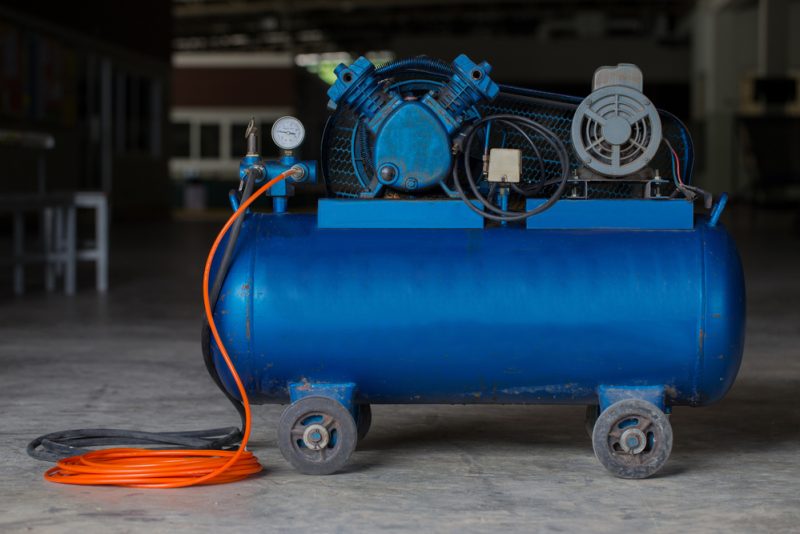Choosing the right air compressor can be a difficult task, especially if you know little about the equipment. Air compressors power a number of tools and are widely used in a plethora of conditions. For example, scuba diving, air painting, construction, and automobile repairs are a few common application areas for this piece of equipment.
The only right way to choose the right piece of equipment is by empowering yourself with the right knowledge.
This guide will help you find the right piece of equipment for your particular need.
Always Begin With The Basics
The best way to begin with any purchase decision is to learn about the basics. These basics would help you determine the type of equipment suitable for your particular application.
- Assess the power requirements
Considering the power requirements for your application is the foremost step. Whether you need the compressor to fill oxygen tanks for hospitals? Or you need it to power heavy pneumatic machinery? Depending upon the type of application, evaluate the total power you’d need. Typically, you may not need much power to inflate a tire, so a mini compressor may suffice. However, if you need to power tools and pneumatic machinery you definitely need a compressor that can provide continuous airflow at high pressure. So, evaluating the power before making the purchase decision is must the foremost step.
- Know the available types
There are two types of air compressors, primarily- reciprocating and rotary screw type compressors. The reciprocating type consists of one or more pistons that push the air through a one-way valve to compress it. These compressors further come as single-stage and two-stage compressors. As the name suggests the air is compressed in either one step or two steps. On the other hand, the rotary screw type is more efficient at providing continuous airflow. It is ideal for powering tools and machinery where continuous flow is needed for specific periods, say a few minutes, such as power wrenches and jackhammers.
Narrow Down With The Specifics
Now that you have the basic knowledge about how the air compressor works and how it can help you, its time to start with your hunt. Essentially, through this process, you shall be narrowing down your purchase through specific figures and measurements.
- Horsepower
Depending on your application, you have a range of 1.5 HP to 6.5 HP. Higher horsepower compressors are usually reserved for industrial applications where heavy load machinery is used. In general, if you’re looking for an air compressor to use tools and equipment that does not require higher power, the aforementioned power range is sufficient for your use. However, experts from Ablesales suggest that horsepower ratings are no longer used in modern air compressors. They also add that you should probably look for CFm or SCFM ratings instead of HP ratings.
- Airflow rate
The airflow rate is usually represented by the CFM rating. The CFM rating is the abbreviation for cubic feet per minute which is used to denote how much volume of air flows through the compressor in unit time. However, the CFM value changes with the change in pressure. For example, if a compressor supplies 2 CFM air at 90 psi pressure, it might deliver less than 2 units of air at a lower pressure value. To tackle this issue, you must add the SCFM values of all the tools and equipment that you are to use and add some buffer to it. For example, to determine the CFM you need from your compressor you should match the standard CFM values at 90 psi and add about 30% as a buffer to this value.
- Space needs & portability
Depending on the pressure and airflow needs the size of your compressor equipment may vary. Usually, higher airflow needs may require larger tanks. Of course, a larger compressor may not be suitable for moving around if needed. So, you can adjust and optimize your needs with the size. If you preferably need a compressor that can be transported from one place to another by dragging it around, you can opt for a portable compressor unit. Or otherwise, you can fix it in a corner of your garage and connect a hose to deliver air to the desired location.
- Power source
Another factor that you must consider when choosing an air compressor is to look for the power source. In most cases, you may be able to have a regular supply of electricity at all times, especially if you are to use the equipment withing your workshop or garage. However, if you plan to be using a portable air compressor there may be chances that you cannot connect to a power source. For instance, air compressors used by road constructors cannot avail of electrical supply at all times. For such situations, you can prefer an air compressor unit that derives power from a diesel engine.
- Tank capacity
Lastly, the size of the tank is another important factor that must affect your purchase decision. As already mentioned, larger tanks are great for continuous air supply. So, a large tank might not be suitable for a tire repair shop, but surely is a great asset for painting applications.
Pick According To Your Budget
In the end, it all boils down to the budget. If you wish for everything on the higher side, you must also be ready to pay high. In other words, larger air compressors, with more power and high-pressure suitability are usually costlier than there counterparts. Similarly, if you look for additional features such as portability, automatic safety switches, etc. you can expect the cost to be on the higher side.
Choosing the right fit for your power needs can promise you longer returns on your investment. So, when you’re looking for an air compressor, make sure you explore your options thoroughly and carry out extensive research. A well-researched decision is most likely to be successful and promising when it comes to efficiency in productivity.








